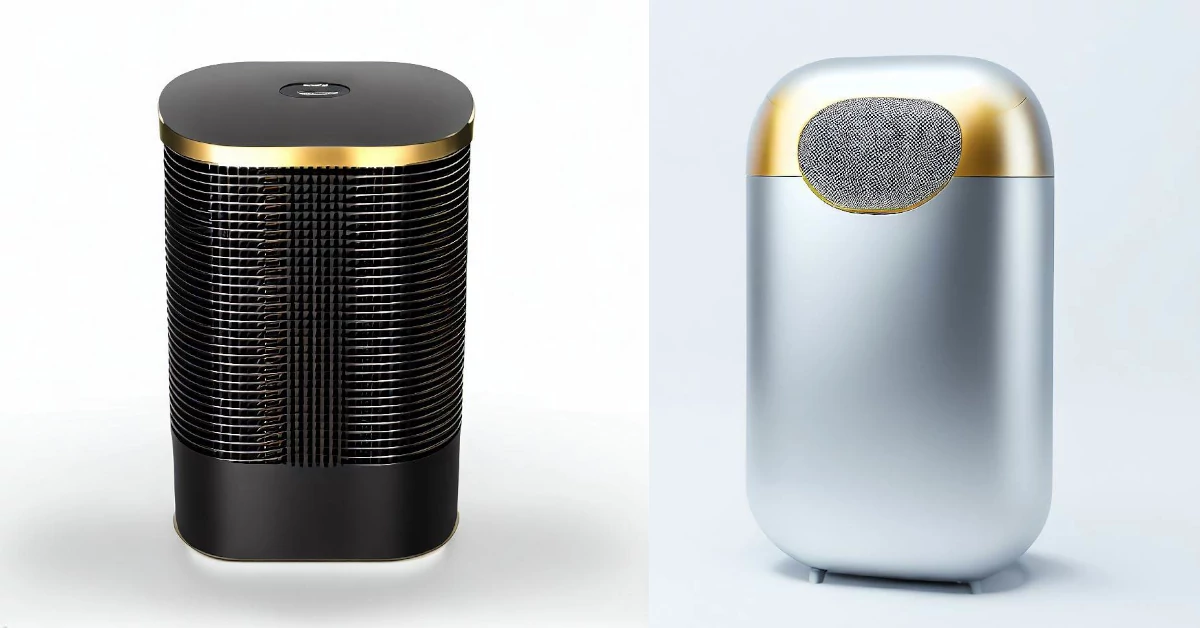Do you suffer from eczema? If so, you know how hard and annoying it can be.
But did you know that allergies can be a big reason why your eczema gets worse? Yes, the air you breathe might be making your skin problem worse.
But don’t worry, because there is a way out.
Buying an air purifier could be the key to getting rid of your eczema symptoms and making your life better overall.
This article will talk about how allergies and eczema are related and how an air purifier can help.
So, sit back, take it easy, and get ready to be able to breathe better.
Eczema and its causes

Causes of Eczema
Eczema’s exact cause is not known, but it is thought to be a mix of genetics and the environment.
People with eczema have an overactive immune system that reacts too strongly to small irritants or allergens in the environment.
If someone in your family has had eczema, allergies, hay fever, or asthma, you are more likely to get it yourself.
Stress, dry skin, and being around irritants are also risk factors.
Symptoms of Eczema
Eczema makes the skin dry, red, and itchy. The signs can be different for each person, but here are some common ones:
- Red or brownish-gray patches on the skin
- Itching, which may be severe, especially at night
- Small raised bumps, which may leak fluid and crust over when scratched
- Thickened, cracked, or scaly skin
- Raw, sensitive, and swollen skin from scratching
Types of Eczema
There are different kinds of eczema, such as:
- Atopic dermatitis: the most common type of eczema, which often starts in childhood and is associated with a family history of allergies or asthma.
- Contact dermatitis: caused by contact with an irritant or allergen, such as soap, cosmetics, or jewelry.
- Dyshidrotic eczema: characterized by small, itchy blisters on the hands and feet.
Triggers of Eczema
Different things can cause eczema in different people, but here are some common ones:
- Exposure to dry air
- Extreme heat or cold
- Certain types of soap, shampoos, bubble bath products, laundry detergents, and fabric softeners with chemical additives
- Certain fabrics like wool
- Stress
Managing Eczema
To control eczema, it’s important to figure out what makes it flare up and stay away from those things.
There are many ways to treat eczema, such as:
- Moisturizers: to keep the skin hydrated and prevent dryness.
- Topical corticosteroids: to reduce inflammation and itching.
- Oral antihistamines: to relieve itching and help with sleep.
- Immunomodulators: to suppress the immune system and reduce inflammation.
Eczema is a long-term skin condition that can make a person feel uncomfortable and lower their quality of life.
Even though no one knows for sure, eczema is thought to be caused by a
Symptoms and management of eczema
Understanding Eczema: Causes and Symptoms
Eczema, also called atopic dermatitis, is a skin condition that lasts for a long time and affects millions of people all over the world.
It can happen anywhere on the body and makes the skin dry, itchy, and red.
The signs and symptoms of eczema can be very different for each person, but here are some of the most common ones:
- Dry skin
- Itchy skin
- Skin rash
- Bumps on the skin
- Thick, leathery patches of skin
- Flaky, scaly, or crusty skin
- Swelling
The color of the rash on swollen skin depends on what color skin the person has.
People with brown or black skin may have small, raised bumps on their skin.
Eczema can also make the skin ooze, crust over, and get darker.
Eczema can happen at any age, but young children are most likely to get it.
The condition lasts for a long time (it’s chronic) and tends to get worse from time to time.
Eczema weakens the skin’s barrier function, which helps the skin keep water and protects the body from the outside world.
Itchy, dry skin and a rash are the first signs of eczema.
These signs show that a person’s symptoms started or got worse after coming into contact with a trigger in their environment.
Eczema flare-ups are less likely to happen if you know what causes them and stay away from them.
Types of Eczema
Eczema comes in seven different forms, including:
- Atopic dermatitis
- Contact dermatitis
- Dyshidrotic eczema
- Nummular eczema
- Seborrheic dermatitis
- Stasis dermatitis
- Neurodermatitis
Everyone with eczema has different symptoms and types, and everyone’s skin care routine affects the affected areas of skin in a different way.
Managing Eczema: Treatments and Tips
Eczema is a long-lasting condition that can’t be cured but can be treated.
As kids get older, many of them find that their symptoms get better on their own.
The most common ways to treat eczema are with moisturizers and corticosteroids that are put on the skin.
Emollients are used every day to keep the skin from drying out, and topical corticosteroids are creams and ointments that are used during flare-ups to reduce swelling and redness.
Immunosuppressants, which help control or slow down the immune system, may be given to people with moderate to severe eczema.
This slows down the symptoms of eczema.
There are many ways to treat eczema, and more are being made all the time.
But there is no treatment that will always get rid of eczema symptoms.
Eczema is a long-term condition that can come and go without warning.
The goal of treating dry, itchy skin is to ease the symptoms.
Managing most types of eczema and its symptoms comes down to using gentle or sensitive skin moisturizers all day long when your skin is dry.
Aside from using moisturizers and topical treatments, there are a few other things you can do to help control the symptoms of eczema:
- Avoid scratching the affected areas of the skin
- Wear loose-fitting clothing made from soft, breathable fabrics
- Use mild, fragrance-free soaps and detergents
- Avoid hot showers or baths, and use lukewarm water instead
- Keep your home’s humidity levels between 30% and 50%
- Use an air purifier to remove allergens and irritants from the air
Eczema is a long-lasting condition that can’t be cured but can be treated.
The main ways to treat eczema are with moisturizers and corticosteroids that are put on the skin.
For moderate to severe eczema, a doctor may prescribe immunosuppressants.
The goal of treating dry, itchy skin is to ease the symptoms.
Aside from using moisturizers and topical treatments, there are a few other things you can do to help control the symptoms of eczema.
People with eczema can reduce the number and severity of their symptoms and improve their quality of life by following these tips and working with a doctor.
How Allergic Rhinitis is Relevant to Eczema and Air Purifiers
Allergic rhinitis, commonly known as hay fever, is a condition that causes inflammation of the nasal passages due to an allergic reaction to airborne particles such as pollen, dust mites, and pet dander.
While it may seem unrelated to eczema, the two conditions are often linked.
People with eczema are more likely to have allergic rhinitis, and vice versa.
This is because both conditions are caused by an overactive immune system that reacts to harmless substances in the environment.
Air purifiers can be helpful for both conditions as they filter out allergens and other irritants from the air, reducing the risk of triggering an allergic reaction.
By removing these particles from the air, air purifiers can help alleviate symptoms of both eczema and allergic rhinitis, making them a valuable tool for those who suffer from these conditions.
For more information:
Allergic Rhinitis Relief: HEPA Filters & More

Triggers and benefits of air purifiers for eczema
Understanding Eczema
Eczema is a skin condition that makes the skin red, dry, and itchy.
It is a long-term illness that affects millions of people all over the world.
Eczema can be caused by irritants, environmental factors, allergens, stress, skin infections, overwashing, metals, acidic foods, and fabrics that trap heat or irritate the skin.
There may not always be a clear reason why eczema gets worse.
Identifying Triggers
A big part of treating eczema is keeping away from allergens and irritants that cause skin problems.
Keeping the skin moist can also help stop eczema from getting worse.
If you have eczema, it’s important to work with a doctor to figure out what sets it off and come up with a treatment plan that works for you.
Air Purifiers and Eczema
Air purifiers with HEPA filters can help with eczema by removing skin and respiratory irritants from the air.
This can help control allergy flare-ups and improve the quality of the air inside.
Up to 99.97% of allergens in the home, such as dust mites, pet dander, pollen, and smoke, can be removed by HEPA filters.
Air purifiers can also get rid of hydrocarbons, which can make skin look dull and make it hard to get a good color.
Getting rid of hydrocarbons from the air can help skin conditions like eczema get better.
Choosing the Right Air Purifier
Not all air purifiers can help with eczema, which is important to remember.
Small particles that irritate the skin can’t be caught by air purifiers with just a basic filter.
The best air purifiers have both a pre-filter that gets rid of bigger particles and a HEPA or true HEPA filter that gets rid of the smallest ones.
Some air purifiers have UV lights that kill germs and viruses as well as bacteria and viruses that cause allergies.
Consulting with a Doctor
If you have eczema and want to use an air purifier, you should talk to a doctor first, especially if you have other health problems or allergies.
Also, it’s important to choose an air purifier that can really clean the air and get rid of allergens that could hurt your sensitive skin.
Some of the best HEPA air purifiers, like the HATHASPACE air purifier, are said to help reduce eczema flare-ups.
Choosing and using an air purifier for eczema
Understanding Eczema and Its Triggers
Eczema is a skin problem that affects a lot of people all over the world.
It causes skin that is dry, red, and itchy, which can be painful and uncomfortable.
Eczema can be caused by many things, like allergens in the air like dust, pollen, and pet dander.
These allergens can make eczema flare up, which makes it hard for people with the condition to control it.
How Air Purifiers Can Help Eczema Sufferers
People with eczema can benefit from air purifiers with HEPA filters because they get rid of allergens and irritants in the air.
HEPA filters are made to catch tiny things that can cause eczema, like dust mites, pet dander, pollen, and mold spores.
Air purifiers with HEPA filters can help reduce the symptoms of eczema by getting rid of these tiny particles in the air.
Improving Indoor Air Quality
Air purifiers with HEPA filters can help improve the quality of the air inside by getting rid of allergens and irritants.
The air inside can be up to five times more polluted than the air outside, and eczema symptoms can get worse when the air inside isn’t good.
VOCs, which are found in cleaning products, paints, and furniture, can irritate skin that is prone to eczema and can be removed by air purifiers with HEPA filters.
Choosing the Right Air Purifier for Eczema
There are a few things to think about when choosing an air purifier for eczema. These things are:
- Type of filter: HEPA filters are the most effective at removing allergens from the air. Look for an air purifier with a true HEPA filter, as some purifiers may claim to have a HEPA filter but actually use a less effective filter.
- Size of the air purifier: The size of the air purifier should be appropriate for the size of the room where it will be used.
- Noise level: Look for an air purifier with a noise level that is appropriate for the intended use.
- Additional features: Consider additional features such as air quality sensors, automatic shut-off, and programmable settings.
It’s important to remember that air purifiers are not a replacement for medical care, and people with eczema should talk to their doctor for personalized advice on how to deal with their condition.
Overall, air purifiers with HEPA filters can help people with eczema because they get rid of allergens and irritants in the air, improve the quality of the air inside, and reduce eczema symptoms.
When looking for an air purifier for eczema, look for one with a true HEPA filter, the right size for the room, the right amount of noise for the purpose, and any other features that might be helpful.
Eczema sufferers can find relief from their symptoms and improve their quality of life by taking these things into account.
Managing eczema symptoms
Managing Eczema Symptoms with an Air Purifier
Eczema is a condition of the skin that can be made worse by allergens in the air.
An air purifier with a HEPA filter can remove these allergens from the air, which can help control allergy attacks and make the air inside your home better.
But not all air purifiers are good for people with eczema.
It’s important to choose an air purifier with a mix of filters that can remove allergens and other airborne irritants effectively.
How HEPA Filters Work
HEPA filters are finely woven mechanical filters that catch 99.97% of even the smallest airborne particles, like dust, pollen, pet dander, mold, and other things that often cause an immune response.
Official numbers from the EPA show that a HEPA filter can get rid of 99.97% of skin and lung irritants in the air.
Choosing the Right Air Purifier
Small particles that irritate the skin can’t be caught by air purifiers with just a basic filter.
The best air purifiers have a pre-filter that gets rid of bigger particles, a HEPA or true HEPA filter that gets rid of the smallest particles, and an activated carbon filter that gets rid of smells and volatile organic compounds (VOCs).
For example, the HATHASPACE air purifier has a five-in-one filter system that cleans the air in your home of dust, VOCs, odors, pet dander, and smoke.
Up to 99.9% of allergens that can cause eczema are caught by it.
Conclusion

Eczema is a complicated condition that can be caused by a number of things, such as allergies.
Even though there is no cure for eczema, there are many ways to treat the symptoms and make flare-ups less likely to happen.
One way to do this is to buy an air purifier.
Air purifiers can help get rid of allergens and other irritants in the air, making the environment cleaner and healthier for people with eczema.
But it’s important to remember that not every air purifier is the same.
When looking for an air purifier, look for one that is made to filter out allergens and other things that make you sick.
In the end, treating eczema requires a multi-pronged approach that might include making changes to your lifestyle, taking medicine, and trying other treatments.
By being proactive about managing your eczema, you can lessen the effect it has on your life and feel better overall.
So, if you have an air purifier, keep making the most of it.
And if you’re thinking about buying one, make sure to do your research and choose the right one for your needs.
Remember that eczema is manageable, and with the right tools and resources, you can take control of your symptoms and live a happier, healthier life.
Links and references
- UpToDate, Mayo Clinic, Cleveland Clinic, National Institute of Allergy and Infectious Diseases (NIAID)
My article on the topic:

